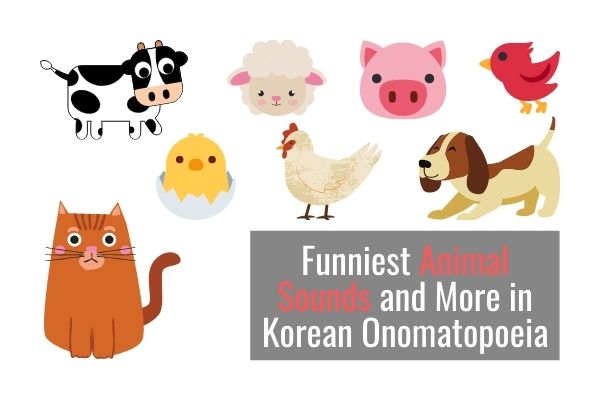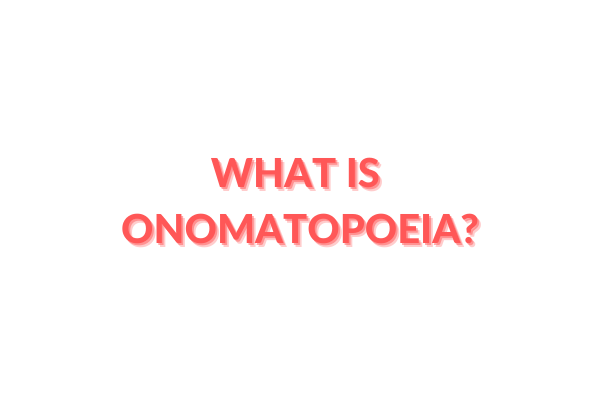Korean onomatopoeia (의성어) are a lot of fun for English speakers.
Here are a list of Korean onomatopoeia and animals sounds that will brighten up your day. It includes object and people sounds that don’t exist in English.

Key Takeaways
- English-speaking cats meow, while Korean cats (go-yang-ee) say ya-ong.
- Dog’s woof is gae’s meong-meong. We also call dogs meong-meong-ee.
- Owl’s hoo is bu-eong-ee’s bu-eong-bu-eong.

Onomatopoeia (ονοματοποιία) is a long Greek word that’s a combination of onoma, meaning “name”, and poiein, meaning “to make”. It actually came to English through Latin.
Think of them as words that imitate the sounds they describe.
Onomatopoeia are cultural and differ around the world. It’s only when you start learning another language you realize how cute they are.
Learn the Most Common Korean Words and Phrases
Even though you don’t hear onomatopoeia everyday, they’re a great ice breaker and way to study Korean.

Animal Sounds
Korean animal sounds are my favorite to compare with English. They’re usually so different (except for the pigeon sound). Onomatopoeia shows how much language and culture shape our worldview.
| Name (English) | Sound | Name (Korean) | Sound |
| Bee | Buzz | 벌 (beol) | 윙윙 (wing-wing) |
| Bird | Tweet | 새 (sae) | 짹짹 (jjeck-jjeck) |
| Crow | Caw | 까마귀 (kka-ma-gwi) | 까악까악 (kka-ak-kka-ak) |
| Cat | Meow | 고양이 (go-yang-ee) | 야옹 (ya-ong) |
| Chick | Cheep | 병아리 (byeong-ah-ri) | 삐약삐약 (bbi-yak-bbi-yak) |
| Chicken (Hen) | Cluck | 암탉 (am-tak) | 꼬꼬댁 (kko-kko-deck) |
| Chicken (Rooster) | Cock-a-doodle-doo | 수탉 (su-tak) | 꼬끼오 (kko-kki-oh) |
| Cicada | ??? | 매미 (mae-mi) | 맴맴 (maem-maem) |
| Cow | Moo | 소 (so) | 음메 (um-meh) |
| Dog | Woof | 개 (gae) | 멍멍 (meong-meong) |
| Duck | Quack | 오리 (oh-ri) | 꽥꽥 (quack-quack) |
| Frog | Ribbit | 개구리 (gae-gu-ri) | 개굴개굴 (gae-gul-gae-gul) |
| Horse | Neigh | 말 (mal) | 히히힝 (hee-hee-hing) |
| Mouse | Squeak | 쥐 (jwi) | 찍찍 (jjik-jjik) |
| Owl | Hoo | 부엉이 (bu-eong-ee) | 부엉 부엉 (bu-eong-bu-eong) |
| Pig | Oink | 돼지 (dwae-ji) | 꿀꿀 (kkul-kkul) |
| Pigeon | Coo Coo | 비둘기 (bi-dul-gi) | 구구 (goo-goo) |
| Rabbit | Thump | 토끼 (to-kki) | 깡총깡총 (kkang-chong-kkang-chong) |
| Sheep | Baa | 양 (yang) | 메에 (meh-eh) |
| Tiger | Growl | 호랑이 (ho-rang-ee) | 어흥 (uh-heung) |
So much onomatopoeia, so little time
Did you know there are many animal sounds in English for a dog barking? You probably did, but weren’t thinking about it. You’ve got bow wow, ruff and woof woof. There’s only one dog sound in Korean, meong meong.
There are also a few sounds cat makes. Mew, meow and of course purr. In this case, Korean is easier. There’s only one cat sound, yaong.
And for frog sounds, we’ve got ribbit, ribbet and croak. But in Korean, there’s only gae-gul-gae-gul.
And for birds, we’ve got tweet and chirp. But in Korean, there’s only jjeck-jjeck.
Sometimes, Korean is more concise than English.
Object Sounds
| Boiling water | Bubble Bubble | 끓는 물 (ggeul-neun-mul) | 부글부글 (boo-geul-boo-geul) 보글보글 (bo-geul-bo-geul) |
| Clock | Tick Tock | 시계 (shi-gye) | 째깍째깍 (jjae-kkak-jjae-kkak) |
| Honk | Honk Honk | 경적 (gyeong-jeok) | 빵빵 (bbang-bbang) |
| Phone | Ring ring | 전화 (jeon-hwa) | 따르릉 (tta-reu-reung) |
| Doorbell | Ring | 초인종 (cho-in-jong) | 딩동 (ding-dong) |
| Bell (small) | Jingle Jingle | 방울소리 (bang-ul-so-ri) | 딸랑딸랑 (ddal-lang-ddal-lang) |
| Rain | Pitter Patter | 비 (bee) | 후두두 (hoo-doo-doo) 주룩주룩 (ju-ruk-ju-ruk) |
| Sizzle | Sizzle Sizzle | 지글지글 (ji-geul-ji-geul) | 지글지글 (ji-geul-ji-geul) |
| Splash | Splash | 첨벙 (cheom-beong) | 첨벙 (cheom-beong) |
| Squeak | Squeak | 삐걱삐걱 (ppi-geok-ppi-geok) | 삐걱삐걱 (ppi-geok-ppi-geok) |
| Train | Choo Choo | 기차 (gi-cha) | 칙칙폭폭 (chik-chik-pok-pok) |
| Siren | Waaaaaahhhhhhh | 사이렌 (sa-yi-ren) | 삐뽀삐뽀 (bbi-bbo-bbi-bbo) |
| Car/Motorcycle | Vroom | 자동차 (ja-dong-cha)/오토바이 (o-to-ba-yi) | 부릉부릉 (bu-reung-bu-reung) |
| Gun | Bang | 총 (chong) | 빵 (ppang) or 빵야 (ppang-ya) |
Why are Korean and English onomatopoeia so different?
Maybe because English and Korean have different vowel sounds as well as cultural backgrounds. The concept of a dog for example is different to Americans and Koreans.
It also might just be because the first person to hear a dog bark in Korea thought it sounded like meong meong. And everyone else ran with it.
People Sounds
This is really where Korean and English start to really show some differences. There are many human actions in Korean that have accompanying onomatopoeia that don’t exist elsewhere.
| Footstep | Tip Tap Tip Tap | 발소리 (bal-so-ri) | 뚜벅뚜벅 (ttu-buck-ttu-buck) |
| Clap | Clap Clap | 박수 (bak-su) | 짝짝 (jjak-jjak) |
| Crying | Boo Hoo | 우는 소리 (woo-neun-so-ri) | 엉엉 (eong-eong) |
| Eating Happily | Nom Nom | 먹는 소리 (meok-neun-so-ri) | 냠냠냠 (nyam-nyam-nyam) |
| Heartbeat | Lub Dub | 심장 박동 (sim-jang-bak-dong) | 두근두근 (du-geun-du-geun) |
| Knock | Knock Knock | 노크 (no-keu) | 똑똑똑 (ttok-ttok-ttok) |
| Slippery | Slippery | 미끄러움 (mi-kkeu-reo-um) | 미끌미끌 (mi-kkeul-mi-kkeul) |
| Mumble | Mumble Mumble | 중얼중얼 (jung-eol-jung-eol) | 중얼중얼 (jung-eol-jung-eol) |
| Be quiet | Shhh | 조용 (jo-yong) | 쉿 (shwit) |
| Sleeping | Zzzz | 자는 소리 (ja-neun-so-ri) | 쿨쿨 (cool-cool) |
| Snoring | Shshsh | 코고는 소리 (ko-go-neun-so-ri) | 드르렁드르렁 (deu-reu-reong-deu-reu-reong) |
| Sleeping Baby | ??? | 아기가 자는 소리 (a-gi-ga-ja-neun-so-ri) | 새근새근 (sae-geun-sae-geun) |
| Brushing Teeth | ??? | 양치 (yang-chi) | 치카치카 (chi-ka-chi-ka) |
| Sneeze | Achoo | 재채기 (jae-chae-gi) | 에취 (eh-chwi) |
| Hurt | Ouch! | 다침 (da-chim) | 아야! (a-ya) |
| Tap | Tap Tap | 톡톡 (tok-tok) | 톡톡 (tok-tok) |
| Suddenly Appearing/Disappearing | Poof | 갑자기 나타남/사라짐 (gap-ja-gi na-ta-nam/sa-ra-jim) | 뿅 (ppyong) |
Onomatopoeia and children
Teaching a child language is super easy with onomatopoeia. Nothing is more engaging for kids than sounds. Try singing the next time you want to get your child’s attention.
Korean Mimetic Words
Mimetic words (의태어 or uitaeeo) are special. They’re similar to onomatopoeic words but instead of describing sound, they cover different types of movement. You can find these descriptive words all over the place in Korea from billboards, TV drama scripts to Webtoons. They add a lot more depth and imagery to Korean writing.
| Suddenly grabbing or biting something | 덥석 (deop-seok) |
| Nodding | 끄떡 (kkeu-duck) |
| Tilting one’s head | 갸우뚱 (gya-woo-ttung) |
| Nimbly/quickly | 후다닥 (hoo-da-dak) |
| Frivolous movement | 촐랑촐랑 (chol-lang-chol-lang) |
| Peeping | 기웃기웃 (gi-wut-gi-wut) |
| Smiling | 방긋방긋 (bang-geut-bang-geut) |
| Colorfully | 울긋불긋 (wul-geut-bul-geut) |
| Moving up and down | 들썩들썩 (deul-sseok-deul-sseok) |
| Twinkling | 반짝반짝 (ban-jjak-ban-jjak) |
| Soft | 말랑말랑 (mal-lang-mal-lang) |
| Tossing and turning | 엎치락뒤치락 (eop-chi-rak-dwi-chi-rak) |
| Turning purple with rage | 붉으락푸르락 (bul-geu-rak-pu-reu-rak) |
| Being in a Hurry | 헐레벌떡 (heol-le-beol-tteok) |
| Blazing sunshine | 쨍쨍 (jjeng-jjeng) |
| Breeze | 솔솔 (sol-sol) 살랑살랑 (sal-lang-sal-lang) |
Now it’s your turn
I want to hear from you.
Let us know which Korean onomatopoeia are your favorite!

![137 Konglish Words You Shouldn’t Live Without [with Examples]](https://linguasia.com/wp-content/uploads/137-Konglish-Words-You-Shouldnt-Live-Without-200x130.png)



Hello Minjung-nim,
As an expat who got here just shy of three months, I’m delighted to read the articles on your website, and I can’t believe it is 3:00 am in the morning and I am still reading them with delight! This is a great website, and I wish I knew about your site before leaving the States. Again, thank you for the wonderful information, and it is truly enjoyable reading them!
Hello Raymond-nim,
Thank you so much! I appreciate it and so glad you like the blog.^^
Let us know some topics you’re interested in and hope you enjoy your time in Korea.
Cool. I like that a tiger has onomatopoeia.
Haha yeah, Korean has some fun animal sounds. Glad you like it!